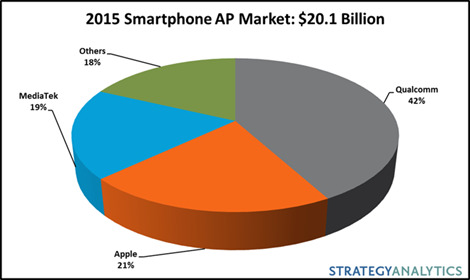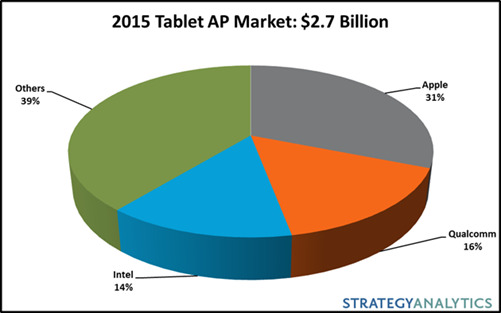Although the smartphone and tablet processor markets actually declined year-over-year in 2015, Apple managed to capture large shares of both in 2015 simply manufacturing for its own devices, Strategy Analytics said in data released on Friday.
Apple reportedly controlled 21 percent of the smartphone processor market, which shrank 4 percent to $20.1 billion. That slotted the company in between Qualcomm's 42 percent — down 10 points — and MediaTek's 19 percent.
Qualcomm's Snapdragon processors are used in a large number of smartphones, but the company faced tougher competition in 2015, including some from Samsung which managed to double processor shipments. Intel actually managed 66 percent growth, but still claimed just a 1 percent unit share.
Strategy Analytics noted that 64-bit chips represented a little over half of smartphone processor shipments, and that Qualcomm overtook Apple in this field, presumably owing to the growing prevalence of phone makers wanting the technology. When Apple launched its first 64-bit processor — 2013's dual-core A7, introduced alongside the iPhone 5s — it was also the first 64-bit ARM-based chip to ship in a phone. Others were still 32-bit and often relied on having four or more cores to boost processing power.
In the tablet realm Apple was by far the market leader in 2015 at 31 percent, reflecting the continued dominance of the iPad. Qualcomm ranked second at 16 percent, while Intel was third with 14 percent, not far ahead of MediaTek. The market as a whole contracted 33 percent to $2.7 billion however, marking the first annual decline for tablet chips.
Strategy Analytics blamed the issue on the popularity of phablets, like Apple's "Plus" iPhones, as well as factors like long tablet replacement cycles. Indeed analysts have linked the iPad's sales decline in the past several quarters to the same causes.
 Roger Fingas
Roger Fingas









 Charles Martin
Charles Martin

 Wesley Hilliard
Wesley Hilliard
 Stephen Silver
Stephen Silver
 William Gallagher
William Gallagher

 Marko Zivkovic
Marko Zivkovic
 Andrew Orr
Andrew Orr








5 Comments
It was really amusing to hear how the other companies claimed Apple's 64-bit processor was a useless gimmick in a smartphone when it was introduced and now they're all using them. Wall Street definitely scoffed at Apple for trying to sell worthless tech to consumers. I'm rather certain no matter what Apple introduces in terms of new tech it will be called useless and lacking in innovation. The anti-Apple conspiracy will continue and I hope someone at Apple will be able to stop all this ridiculous talk about Apple not being able to innovate.